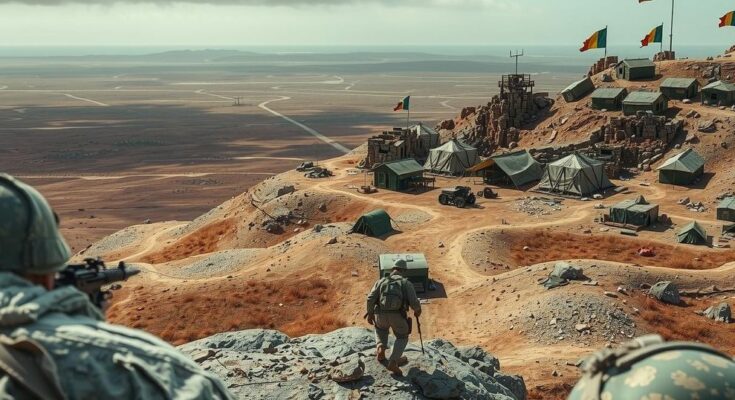The M23 rebels have captured Walikale in eastern DRC, rejecting ceasefire calls from the government and Rwanda. This conflict, intensified by historical tensions and regional dynamics, reflects a significant escalation as the rebels aim to advance towards Kinshasa. Analysts highlight the necessity of direct talks to address the underlying issues affecting peace efforts.
The M23 rebel leader in the eastern Democratic Republic of Congo (DRC) has dismissed calls for a ceasefire from the DRC government and Rwanda, asserting these appeals do not concern his forces. The rebels have successfully captured the strategic town of Walikale, marking a significant advance into DRC territory, which has already seen the takeover of the two largest cities in the east since January.
Walikale, a town with a population of 15,000, fell after fighting on Wednesday between the rebels and government forces along with allied militias, according to local residents and army representatives. The ongoing conflict in eastern DRC, stemming from the aftermath of Rwanda’s genocide in 1994 and competition for valuable minerals, is reported to be the worst since the destructive war from 1998 to 2003, which involved several neighboring nations and resulted in millions of casualties.
The conflict has escalated into a broader regional war, influenced by the engagement of troops from DR Congo, Rwanda, and Burundi this year. Capturing Walikale places the rebels within 400 km of Kisangani, DRC’s fourth-largest city and a significant port along the Congo River. The minerals-rich area of Walikale connects four eastern DRC provinces, namely North Kivu, South Kivu, Tshopo, and Maniema.
Speaking to Walikale residents, an M23 officer reiterated the commitment of his forces to advance towards the capital, Kinshasa, stating, “We are going to leave a small group of our soldiers to provide you security.” He asserted their intention to march approximately 1500 km toward Kinshasa.
In a separate event, President Felix Tshisekedi of DR Congo and President Paul Kagame of Rwanda met in Qatar, where they called for an immediate ceasefire. However, the M23 leader rejected this appeal, clarifying their motivations lie in local issues rather than external influences. “We are Congolese who are fighting for a cause,” stated Corneille Nangaa, leader of the Congo River Alliance (AFC).
Further exacerbating tensions, the United Nations accused Rwanda of supplying arms and troops to the M23 rebels, a claim Rwanda has denied, asserting its military actions are purely defensive. Previous expectations of direct talks between DR Congo and M23 in Angola were disrupted when the rebels withdrew, citing EU sanctions against their leaders and Rwandan officials as a reason for their withdrawal.
Analysts interpret this action as indicative of the rebels’ confidence as well as the disarray and distrust surrounding various peace initiatives from foreign governments. The Angolan foreign ministry expressed confusion over the call for negotiations in Qatar, emphasizing the importance of African-led solutions to African problems. Nangaa has called for direct discussions with DR Congo, stating it is the only viable means to resolve the ongoing conflict, highlighting their call for an end to the persecution of Tutsis and improvements in governance.
In summary, the M23 rebels’ recent capture of Walikale signifies a troubling escalation in the conflict within the DRC, dismissing ceasefire calls from both the DRC and Rwanda. The situation underscores the deep-seated issues rooted in historical tensions and the struggle for resource control, as well as the complexities surrounding peace negotiations that reflect regional influences. The urgent need for a resolution is amplified by the calls for direct dialogue, emphasizing the rebels’ demands for national governance improvements.
Original Source: aapnews.aap.com.au




